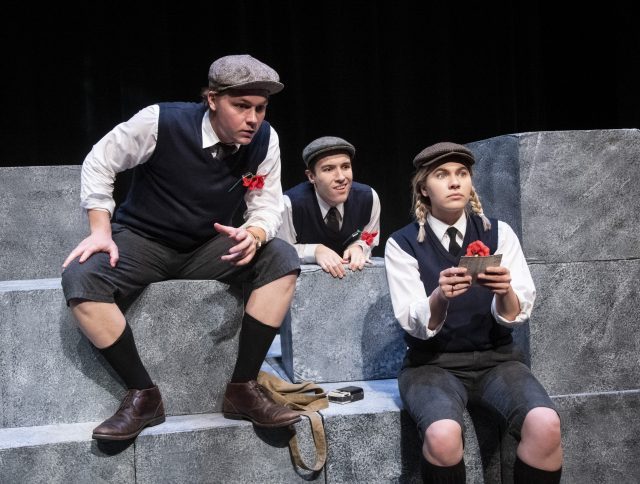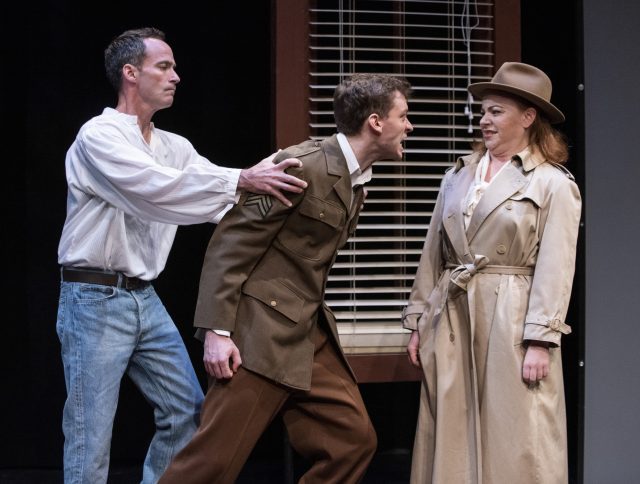
Three schoolchildren get ready to perform Hamlet in PTP/NYC revival of Tom Stoppard two-act play (photo by Stan Barouh)
PTP/NYC: Potomac Theatre Project
Atlantic Stage 2
330 West 16th St. between Eighth & Ninth Aves.
Through August 4, $22.50-$37.50
ptpnyc.org
To Shakespeare newbies — or even longtime Bard fans — Willie B.’s works can feel like they’re written in a different language, with unique rhythms and phrasings and complex plots that can be difficult to unravel. Czech-born British playwright Tom Stoppard (née Tomas Straussler) first tackled Shakespeare in 1966’s Rosencrantz and Guildenstern Are Dead, which gave new life to a pair of minor characters from Hamlet. In act two, the Player tells Guildenstern, “You understand, we are tied down to a language which makes up in obscurity what it lacks in style.” Stoppard takes that idea to a whole new level in Dogg’s Hamlet, Cahoot’s Macbeth, two Shakespearean romps, meant to be performed together, currently being revived by PTP/NYC (Potomac Theatre Project) at Atlantic Stage 2 through August 4.
In Dogg’s Hamlet, inspired by a section of Ludwig Wittgenstein’s Philosophical Investigations and Ed Berman’s Dogg’s Troupe, a children’s school is preparing for a fifteen-minute version of Hamlet, but they speak in Dogg, an alternate language in which English words mean something else. “Undertake sun hollyhocks frankly sun pelican crash?” Baker (Connor Wright) asks as he and two other students sit down to have lunch. “Hollyhocks? Nit!” Abel (Zach Varicchione) replies. Baker: “Squire!” Abel: “Afternoons!” Baker: “Afternoons! Phew — cycle racks hardly butter fag ends.” Charlie (Madeleine Russell): “Fag ends likely butter consequential.” Abel: “Very true.” Thus, the audience has to use its linguistic skills to untangle meaning, much like a newcomer to Shakespeare. (In the published version of the play, Stoppard does translate Dogg, so, for example, “Very true” means “Needs salt.”)
When truck driver Easy (Matthew Ball) arrives to deliver the props for the play, he and the students have trouble communicating, because Easy doesn’t speak Dogg, and the students don’t know English. The props are tossed around to form walls of blocks that spell out such phrases as “Maths Old Egg,” which confuse Easy but infuriate the headmaster, Dogg (Peter Schmitz), because they form gibberish (doggerel?). Shakespeare to the students is like Dogg to the audience; the students perform the brief Hamlet in its original language, even though they don’t understand the words. But context is everything, and we all learn to figure it out. Or we don’t. PTP/NYC, which combines experienced actors with young apprentices, doesn’t quite get hold of Dogg’s Hamlet until nearer the end of its forty-five minutes; it mostly comes off as too silly, with haphazard slapstick comedy and uneven performances, although Ball is terrific as Easy, essentially a stand-in for the audience, trying to figure out just what the heck is going on.

An inspector (Tara Giordano) interrupts an illegal house performance of Shakespeare in Tom Stoppard’s Cahoot’s Macbeth (photo by Stan Barouh)
Director Cheryl Faraone, the cast, and Stoppard fare much better in the fifty-five-minute Cahoot’s Macbeth, which the three-time Tony-winning playwright dedicates to Czech playwright Pavel Kohout, who staged shows in living rooms in the 1970s when the government banned them from theaters during “normalization.” A society woman (Lucy Van Atta) is hosting a truncated version of the Scottish play in her home, starring actors Pavel Landovsky (Christopher Marshall) as Macbeth and Cahoot (Christo Grabowski) as Banquo. Audience members are her invited guests to watch this illegal gathering. Everything is going along fine until a siren is heard offstage and an inspector (Tara Giordano) enters, stopping the proceedings. She has come both to bury the show and to praise it.
She is enamored of Landovsky and the actress playing Lady Macbeth (Denise Cormier) but raves about their past performances away from the theater, in their day jobs, singling out Landovsky hawking papers at a newsstand and the woman working as a waitress. When Macduff (Will Koch) comes in and recites his lines, the investigator declares, “What’s your problem, sunshine? Don’t tell me you found a corpse — I come here to be taken out of myself, not to be shown a reflection of the banality of my own life,” echoing the audience’s feelings about the intrusion of the investigator herself. She’s also well aware of Cahoot, who she refers to as a “social parasite and slanderer of the state.” After Cahoot acts like a dog (barking is yet another language, in this case one that also evokes the previous act), the inspector leaves, only to come back later, joining Easy, who has a delivery to make and now speaks only Dogg. The wordplay explodes in cunning yet hysterical ways as the madcap story reaches its conclusion.
Dogg’s Hamlet, Cahoot’s Macbeth lasted less than a month when it debuted on Broadway in 1979, and it’s easy to see why: It’s a strange exercise in the language of theater and authority and how the two tend not to mix well under authoritarian leadership. There’s a Monty Python–like quality to some of the humor — the British comedy troupe often had people in power (police, censors, government officials) interrupting skits, and PTP/NYC’s (Scenes from an Execution, The Possibilities / The After-Dinner Joke) version of Dogg’s Hamlet even includes a snippet of MP’s television theme music, which is actually John Philip Sousa’s “The Liberty Bell” — but where the first play is inconsistent and scattershot, the second play flows much more smoothly in Faraone’s hands. Perhaps it’s the political aspects of Stoppard’s attack on Czechoslovakia’s suppression of freedom that has the cast — which also features Olivia Christie, Emily Ma, and Katie Marshall as three young, attractive witches (and, later, three murderers), Schmitz as King Duncan, and Varicchione as Malcolm — and the crew at the top of their game. It’s delightfully fun, like doing a crossword puzzle but not in your native tongue; you’re not going to get it all, but it’s cool trying. Dogg’s Hamlet, Cahoot’s Macbeth is playing in repertory with Havel: The Passion of Thought, consisting of works by Harold Pinter, Samuel Beckett, and former Czech dissident and president Vaclav Havel, who Stoppard was greatly impressed by and met with in 1977.